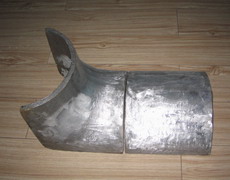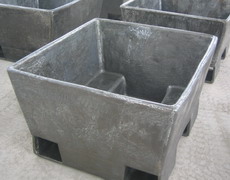| |
The effect of cast steel chemical composition C, Si,
Mn, S, P, Cr, Mo, Ni to mechanical properties
The alloy composition of C, Si, Mn, S, P,
Cr, Mo and Ni is very important for the mechanical properties to
carbon steel and alloy cast steel. Many steel casting buyers and
manufacturers hope to control these elements to the most reasonable
range to improve the performance of cast steel products.
Herein, we briefly introduce the effect of these elements.
1. Carbon (C)
The carbon content will affect the hardness and welding property of
the cast steel.
Advantages:
Higher content will cause the higher hardness.
Disadvantages:
a. Higher content of C will cause worse welding property, in other
words, more difficult for welding, so most of welding part will
require the mild carbon steel.
b. Moreover, higher content of C will cause worse plasticity and
toughness.
2. Silicon (Si)
Advantages:
Silicon content also increases the hardness and wear resistance of
cast steel.
Disadvantages:
High content of Si causes worse plasticity and toughness.
3. Manganese (Mn)
Advantages:
a. Manganese can increase the tensile strength of cast steel.
b. Also could remove or improve the bad influence of Sulfur.
c. Mn could improve the hardening capacity of heat treatment.
d. Moreover, higher Mn content could improve the abrasive
resistance.
Disadvantages:
a. High content of Mn will cause worse welding capability.
b. High content will reduce the heat conductivity of steel, so
easier to cause cracks.
4. Sulfur (S)
Disadvantages:
Normally, Sulfur is the harmful impurity of cast steel. Sulfur will
cause fragile, especially after quenching heat treatment, and during
machining at high temperature. So lower Sulfur will be better,
normally less than 0.04%.
5. Phosphorus (P)
Disadvantages:
Phosphorus will reduce the plasticity and toughness of cast steel,
especially at low temperature. So, it is better to control it less
than 0.04%.
6. Chrome (Cr)
Advantages:
a. Chrome could improve the hardening capacity of heat treatment,
and especially improve the abrasive resistance.
b. In addition, high content of Cr could improve the corrosion
resistance, so it is an important alloy for stainless steel.
Disadvantages:
Chrome will reduce the plasticity of cast steel.
7. Molybdenum (Mo)
Advantages:
a. Molybdenum could improve the hardening capacity, and
heat-resisting strength of heat treatment, so it could reduce the
brittleness of quenching treatment.
b. Mo alloy can also improve the surface abrasive resistance.
8. Nickel (Ni)
Advantages:
a. Nickel could improve the tensile strength and toughness of cast
steel, improve the hardening capacity of heat treatment.
b. High content of Ni could improve the corrosion resistance and the
properties of other alloys.
Although Cr, Mo, Ni alloys have many
advantages, and almost zero disadvantages, but their material costs
are very high, so will cause the high prices to cast steel parts.


Home |
More Articles |
|
